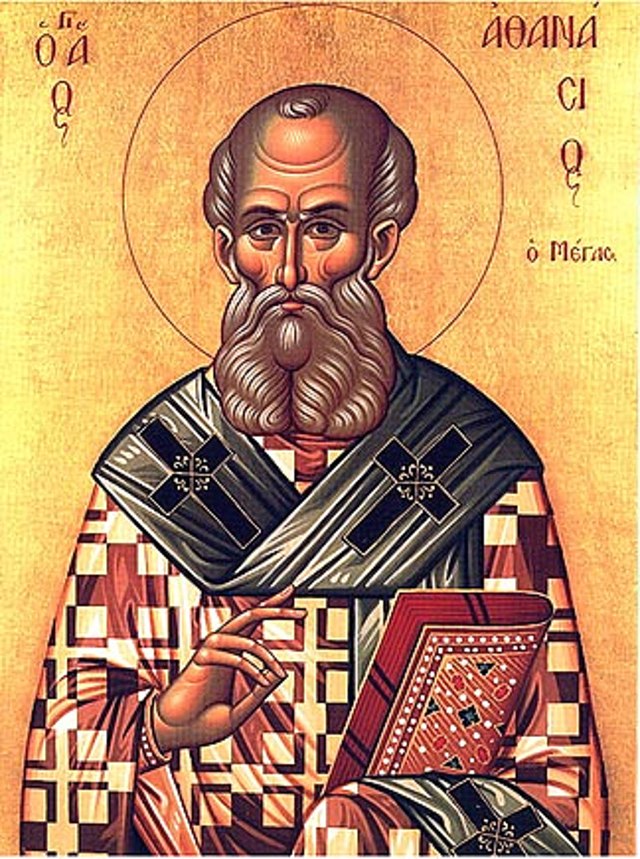By: Jerry Bogacz, PhD Candidate | December 24, 2022
C.S. Lewis provides an outstanding preface on the importance of reading old classics and not just contemporary works. “It is a good rule after reading a new book, never to allow yourself another new one till you have read an old one in between.” (preface) On the Incarnation by Athanasius (b. 298 – d. 374) certainly qualifies as a must-read old classic.
Lewis continues, “Every age has its own outlook. It is especially good at seeing certain truths and especially liable to make certain mistakes. We all, therefore, need the books that will correct the characteristic mistakes of our own period. And that means the old books.” (preface) Although written in the fourth century, it is stylistically and textually straightforward and accessible and serves as an elegant theological meditation on the divine Word made flesh. Athanasius provides “an elementary instruction and an outline of the faith in Christ and his divine manifestation to us.” (56)
Athanasius was The Right Person at the Right Time
I have often heard it said he or she was the right person at the right time in the right place. With respect to fourth-century church history and the doctrine of the Incarnation, Athanasius of Alexandria, without doubt, merits the intersection of the right person, time, and place. Arius of Alexandria teaching that Jesus was a god-like created being but was not God was gaining strength and popularity. Athanasius, a newly ordained deacon and secretary to the Bishop of Alexandria, answered the challenge to refute what became known as the Arian Heresy.
His courageous proclamation and refusal to compromise in defense of Jesus of Nazareth as incarnate Son of God did have its costs. He endured exile five times under four Roman emperors, including Constantine, for a total of 17 years. Yet he prevailed over all opposition. In 325, a church council of over three hundred bishops met in Nicaea to resolve the deep tension between the humanity and deity of Christ. Athanasius accompanied his bishop to the council armed with His treatise, On the Incarnation. The argument of Athanasius that the Son was fully God, co-equal and co-eternal with the Father was accepted at Nicaea, and Arianism experienced a serious setback.
Athanasius vs. Macarius
Athanasius directs his teaching to a priest under his authority, Macarius, whom he calls a “true lover of Christ.” He instructs Macarius on a winsome explication of the first manifestation of God, Jesus of Nazareth. He asks Macarius to join him on this journey:
We must take a step further in the faith of our holy religion, and consider also the Word’s becoming Man and His divine appearing in our midst…he [Jesus] has not assumed a body as proper to His own nature, far from it, for as the Word He is without body. He has been manifested in a human body for this reason only, out of the love and goodness of His Father, for the salvation of us men. (2)
Jesus, as the Word of God, is the chief intersection point for creation, redemption, and the new creation. His final three chapters are a refutation of the Jew’s traducement and the Gentile’s derision. He closes with a call to live a godly life in the love of God in anticipation of the heavenly riches that await those who persevere.
Argument for Orthodox Christology
Athanasius delivers a powerful scriptural argument for the traditional orthodox Christology of Jesus as fully God and fully man. He effectively uses the Socratic method to frame his arguments. His message throughout emphasizes a necessary continuity between creation and salvation with the work of Jesus, the Word, the eternal bridge to both:
There is thus no inconsistency between creation and salvation for the One Father has employed the same Agent for both works, effecting the salvation of the world through the same Word who made it in the beginning. (2)
He briefly engages the gnostic dualism and Greek Platonic thought about the origin of the universe. The distinctiveness of the entire creation argues for mind as the extrinsic, pre-existent cause, not a self or spontaneous generation. He questions and then answers with powerful insight about the difference between a craftsman and a Creator:
How could God be called Maker and Artificer if His ability to make depended on some other cause, namely on matter itself? If He only worked up existing matter and did not Himself bring matter into being, He would be not the Creator but only a craftsman. (3)
The Logos Brings Being from Non-Being
God, through his own Word and our Lord Jesus Christ, brings the entire created order from non-being into being. The apex of God’s creation is man, who alone is uniquely created in God’s image. But wait, aren’t we talking about God becoming man? Why talk about man’s creation? He bluntly answers,
“It was our sorry case that caused the Word to come down, our transgression that called out His love for us, so that He made haste to help us and to appear among us. It is we who were the cause of His taking human form, and for our salvation that in His great love He was both born and manifested in a human body.” (4)
Our transgression and disobedience of the Eden commandment ushers in the consequences of the cataclysmic fall. Athanasius equates this transgression and corruption to the return of non-existence. God, through the Word, called man into being. But man, through disobedience, suppresses the truth and knowledge of God, leading toward a path of non-existence. God, who is good, alone exists. Evil is the antithesis of good, and there is non-being. God has a dilemma. It is “monstrous that beings which once had shared the nature of the Word should perish and turn back again into non-existence through corruption.” (6) Man, chained to corruption, is moving toward destruction.
The Transcendent Becomes the Immanent
God must do something but what is he to do? He could reverse and undo the punishment of death but that is completely inconsistent with his character. Yet allowing ultimate destruction and non-existence of those made in His image is untenable and unworthy of Him. Athanasius rejects man’s solo act of repentance as the solution. The death of man is the problem and must be dealt with. Man needs to know his maker. God must renew His image in humankind, so that men might once more come to know Him. This could only be accomplished by way of the ultimate transcendent becoming the ultimate immanent through the man Jesus the ultimate image of God. The Word of God will reverse the corruption:
For He alone, being Word of the Father and above all, was in consequence both able to recreate all, and worthy to suffer on behalf of all and to be an ambassador for all with the Father. For this purpose, then, the incorporeal and incorruptible and immaterial Word of God entered our world. (7)
His entrance in bodily form was to serve as a sacrifice with the purpose to abolish death by offering himself as a substitute on our behalf. This reality of the atonement only has efficacy when divinely linked to the reality of the Incarnation.
The Purposes of the Word Becoming Flesh
Athanasius requires us to grasp the purposes of the Word becoming flesh in the person of Jesus:
- Man may know Him through his humanity and not as an abstraction.
-
Through his life, teaching, and miracles, he is the Word of the Father, the Ruler, and the King of the whole creation.
-
Death is defeated, and corrupted man is restored to his meaningful existence. The brutal, humiliating, and public death on the cross must precede the great paradox of His glorious public resurrection proclaiming victory over death and all the disgrace heaped upon Him. Satan, who revels in death, is defeated, and it is he alone “who remains truly dead.” (21) Not only is death itself conquered but man’s fear of death is transformed into the great hope and glory that awaits post-death. The resurrection of the Word fulfills the accomplished mandate of the Incarnation.
After a marvelous presentation of his case for the Incarnation, Athanasius turns to engage the ridicule and unbelief of the Jews and the Greek gentiles. The concept, let alone the reality, of God becoming a man is completely alien to their worldviews. He came (43) as man and not in some nobler form, for He came not to make a display, but to heal and teach suffering humanity.
A Challenging Methodology
His methodology is to challenge what they know or should know in principle and fact. He chastises the Jews for their unbelief and fictional hopes of a future Messiah. His refutation is based upon the well-known prophetic Old Testament scriptures about the virgin birth to the suffering servant of Isaiah. Athanasius doggedly admonishes them for not comprehending how their own sacred texts describe and prophecy a Savior fulfilled in the God-man Jesus Christ. He cites the vision of Daniel as the “supreme point” of refutation and the “notable proof of the coming of the Word that Jerusalem no longer stands, neither is prophet raised up nor vision revealed among them.” (31)
The Gentiles scoff at the notion of God in human form, “yet fail to see the shame and ridiculousness of their own idols.” (33) He analogizes the mind of man infusing his entire being yet finding expression in any given part of it to the Word infusing all of creation and finding expression in part of it, a human body. For surely, if they can identify God’s presence in all of creation, then why detest and mock His manifestation in a part of that creation, a human body?
The Greeks’ Failure to Understand
Despite all the wisdom gleaned from Greek philosophy, “the Greeks failed to convince even a few from their own neighborhood in regard to immortality and the virtuous ordering of life.” (39) However, Christ, with his simple words and his “uneducated” Jewish peasant disciples changed the hearts and minds across cultures. He asks them then, who is this man-Christ that demonstrates more power than that of their gods? The increasing influence of Christ counters the growing irrelevance and decay of popular Greek paganism. His argument from experience recognizes the continued presence and work of the Word, which exposes the entire Greek pantheon as creations of men and completely impotent.
Athanasius’s Christology is a Biblical Christology
Athanasius articulates an explicitly clear biblical Christology. Jesus is fully God and fully human. He is preexistent to the creation and co-eternal with the father. Creation has a beginning. The Word does not. Athanasius presents a comprehensive Gospel where creation and redemption are not isolated entities but eternally continuous and linked with the Word. The One who created is the only one that could, as both a man and the second person of the trinity, solve man’s problem of sin, death, and corruption. Athanasius rightly understood that the question “Who is Jesus?” cannot be divorced from the functional aspects of His earthly ministry concerning what he did and the ultimate question of redemption “How shall we be saved?” He does not attempt to expound metaphysical notions to his Christology. Philosophical argument is only briefly engaged when refuting Greek thought.
Conclusion
He concludes his teaching to Macarius with a challenge to learn and grasp the coming of His second manifestation. This manifestation will be “glorious and divine indeed, when He shall come not in lowliness but in His proper glory, no longer in humiliation but in majesty, no longer to suffer but to bestow on us all the fruit of His cross, the resurrection and incorruptibility.” (45) Mathew describes the Magi from the east seeing the child with his mother Mary, and they bowed down and worshiped him. (ESV, Mathew 2) This provides a foreshadowing of Paul’s description of the future exultation of Christ that with the name of Jesus, every knee should bow, in heaven and on earth and under the earth, and every tongue acknowledge that Jesus Christ is Lord. (ESV, Philippians 2)
Editor’s Note: Jerry would like to encourage you to read a chapter of Athanasius’s book “On the Incarnation” each day as a devotional. To access “On the Incarnation,” click the link below. For your convenience, a PDF version of his work has also been added.
https://www.worldinvisible.com/library/athanasius/incarnation/incarnation.p.htm
 Loading...
Loading...
About the Author

Jerry Bogacz was born and raised in the Chicago area. Jerry and his wife Kathy relocated to Lexington, Virginia in 2015 where they reside to this day. As a scientist, Jerry worked as a research scientist and project manager in immunodiagnostic and DNA diagnostic product development for Abbott Laboratories in northern Chicago. Jerry is a Ph.D. Candidate in the Ph.D. in Theology and Apologetics program at Liberty University. He graduated from Biola University with two degrees–an MA in in Apologetics and an MA in Science/Religion. He was a resident in 2013 at the C. S. Lewis Fellowship at the Discovery Institute. Also, Jerry received training at the CrossExamined Apologetics training in 2014. Ministerially, he served as a pastoral and teaching elder at Evanston Bible Fellowship in Evanston, IL (2001-2015). Jerry’s primary areas of research are focused around the integration of science and theology, biblical anthropology, bioethics, and worldview studies.
Copyright, 2022. BellatorChristi.com.






Athanasius is a theologian that is so important but far too many Christians are ignorant of. Thanks for taking the time to present this and the challenge to read his writing On the Incarnation.
[…] Source: Summary of “On the Incarnation” […]